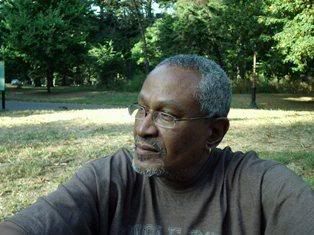I have heard Mervyn Taylor read this poem three times and each time saw with my shivering essence the heartbreaking beauty of New York, more specifically, Brooklyn, that most mysterious of boroughs. Saw a New York crackling like a fire with promise and eradication. Saw a specific New York, closer than approximation, one I know, of supers and late-night MacDonalds, dying relationships, lost keys and keys lost to boozy nights. The pot that never melts, except in some mayor's false paradise. This is an amazing poem. A parade. The universe.
The Center
of The World
I.
From
here I can see the world, all the people
walking
down Flatbush Ave., going into stores,
waiting
at the bus stop, all the latecomers rushing
into the
subway cat-a-corner from my window,
across
Ocean Ave. all the new immigrants in winter
wearing
too much clothes, the police recruit from
Long
Island under the awning of the Arab grocer.
Salaam,
I can hear the crack addict, the last of
his kind
disappearing between the floorboards,
arguing
with the Arab chief, the one with the scar
in his
left cheek next door to whom the Asians
scrape
calluses from feet three times the size
of their
own, giving them the designs they want:
star,
crescent, half-moon, the flag of any country.
I see
all four seasons pass through the park, in
winter,
the lake shimmering between the trees,
in
autumn the nervous leaves shaking and falling,
the
sudden flood of green in spring. And summer,
oh
summer, with the smoke of a hundred grills,
the
smell of bar-b-q, the birthday balloon sailing
away
from the crying boy, the slap of dominoes
on the
picnic tables, the relentless hawk, a rat
dangling
from its talons, dripping red onto the
cyclist’s
jersey, the yellow paddleboats on their
circular
journey around the island that is the ducks’
breeding
ground, dense, impenetrable, the raccoon
that
scared us after the concert at the band shell
the
night Rudder sang his calypso blues, where
a year ago
Odetta made her last appearance half-
sitting
under a falling moon. And the vet whose
shock of
white hair stood out among the runners,
I don’t
hear his sidewise shout anymore.
In the
zoo the enclosure where the bears ate a boy
has a higher
fence, painted with pretty pictures.
On
Sundays the drummers still form their circle,
and in
the evenings horns announce the arrival of
the
Haitians, their sound atonal, harsh, unrelieved.
They
move in concentric circles, singing not words
but a
series of o’s, rising, falling, rising.
II.
Sometimes
the midnight lines at the McDonald’s are
seven
registers across. Here a homeless man might sit,
nursing
coffee, pretending to wait for the No. 12.
I know
where it goes, out Linden, through dangerous
parts of
East New York, I take it almost to the end of
the
line, to a building boasting a thirteenth floor and
terraces
with a great view of flights leaving Kennedy.
I watch
the Puerto Ricans on their day, the coquis on
the
hatband of the older men. Fridays the Jews
stream in
numbers toward the end of the park where
the big
synagogue is, the cops with backs to them
blocking
traffic. I see all the time accidents at this
five-way
intersection, the elderly couple never
making
it to a wedding, their car spun round facing
the
opposite way. I catch, on Labor Day,
steel
pans going down the middle of the avenue,
a girl
waving a mysterious flag, the sergeant longest
on the
beat saying, ahh, don’t worry ‘bout it, too long
to
explain what wining is. I’ve heard relationships die
at 3 am,
among the pillars in the pavilion, or at the stoplight
while a
car idled. I’ve heard the prettiest rendition of
a Scott
Walker song come up the fire escape and through
my
window, through a long and sleepless night…
III.
I’ve
heard the shocking quarrels of people over
a
parking space, over love, over nothing. I’ve
seen a
boy gasp his last between the park benches
after
the pop, pop turned out not to be fireworks,
the cap
on his head turning red. There are times
I looked
out to see not a soul, and times it seemed
a
congregation had gathered under my window,
times
when the heat would rise and then would not,
my guest
and I sleeping in gloves.
I’ve
lived through three supers, watched their sons
grow to
manhood. I’ve let the woman next door
climb
through my window when she’d forgotten
her
keys. I’ve stepped over the nodding ghosts of
men
acting like doormen in the lobby, their number
dwindling
till there was one, who could hardly lift
my
suitcase. I leave but always come back here,
where I
review things from this vantage point,
the
confluence of people and lives after deliveries
are
dropped off early in the morning by trucks
rambling
through this intersection of the world.
--Mervyn Taylor, from No Back Door (Shearsman), 2010

